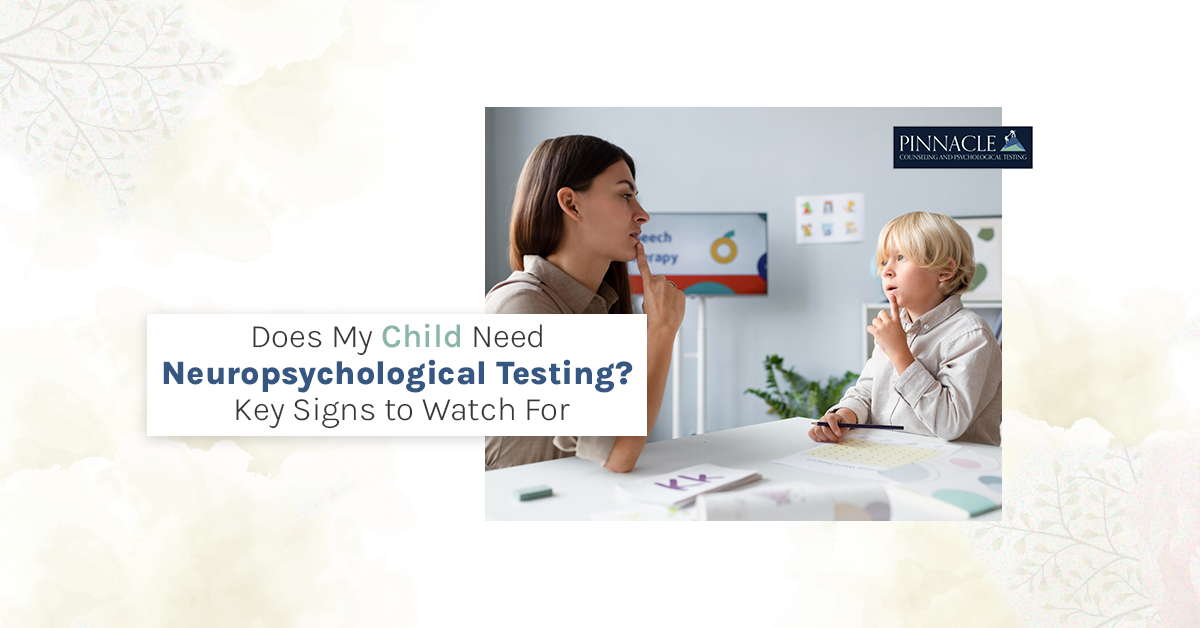Watching your child grow is like climbing a big mountain. You want to help them with each step. Sometimes, your child may move slowly or feel stuck. Neuropsychological testing helps to understand your child’s thinking patterns and how to work with their challenges to help them live a successful life. We will share simple signs to watch forthat will help you know when to seek testing.
What Is Neuropsychological Testing?
Neuropsychological assessments consist of diverse questions and tasks that only a trained psychologist can administer. These tasks look at memory, attention, language, and other areas of functioning. The psychologist can then look at all aspects of the assessment to determine your child’s strengths and weaknesses. At Pinnacle Counseling and Psychological Testing, we use these tests to guide care. A licensed psychologist will meet with you and your child after testing is completed to explain the results in a way that are easy to understand. You also get a full report with tips, tools, and any necessary accommodations to help your child.
Key Sign 1: Memory Trouble
Does your child forget things often?
- They may not remember homework steps.
- They may lose toys or books frequently.
If forgetful days keep coming, this could indicate a memory challenge. Testing can show if your child’s brain needs training from a licensed professional in order to strengthen these skills, or accommodations to account for persistent difficulty.
Key Sign 2: Trouble Paying Attention or Keeping Still
Is your child having trouble staying still?
- They may look away during stories.
- They may start games but not finish them.
- They may daydream when you talk.
Testing helps see if their brain has trouble focusing.
Key Sign 3: Learning Slower Than Peers
Does your child find schoolwork to be a consistent challenge?
- Reading takes a long time.
- Math facts do not stick.
- Writing feels like an uphill battle.
When learning feels too tough, testing can help find the cause.
Key Sign 4: Trouble with Words
Does your child struggle to speak or understand words?
- They say the wrong words in a sentence.
- They mix up sounds when they talk.
- They do not follow simple directions.
Tests for language skills show if speech or understanding is a challenge.
Key Sign 5: Mood or Behavior Changes
Have you noticed big swings in mood?
- Your child seems sad or worried a lot.
- They get furious over small things.
- They avoid friends or family for no apparent reason.
Brain changes can affect mood. Testing can help find the root cause.
Key Sign 6: Motor Skill Difficulties
Does your child find it hard to tie their shoes or catch a ball?
- Handwriting is very uneven.
- They trip or bump into things more than other kids.
Neuropsychological tests include simple movement checks. These show if motor skills need support.
Key Sign 7: Social Struggles
Does your child find it hard to make friends?
- They do not join others in play.
- They seem puzzled by group games.
- They have trouble reading others’ facial expressions.
Testing can pick up on social processing needs.
When to Talk to Your Child’s Doctor
You should talk to a doctor or psychologist if you see two or more of these signs over the course of multiple weeks. Early steps can help your child feel less stuck.
What to Expect at Pinnacle Counseling and Psychological Testing Center
Warm Welcome
- We begin with a welcoming office environment.
- You will be greeted by your psychologist who will listen to your concerns.
Thorough Evaluation
- Based on your concerns, your psychologist will put together a testing battery (a number of tests) that will help them assess for problems that may be causing challenges.
- The licensed psychologist will administer the tests, some of which are question and answer, some are like puzzles, and many are administered via iPad.
Friendly Feedback
- Your psychologist will meet with you and your child.
- We will explain all of the results in a way that is meaningful and easy to understand..
Personal Plan
- Your psychologist will write a report that includes recommendations for moving forward, and suggests any necessary school or work accommodations.
- We give clear steps to help at home and at school.
Ongoing Support
- We offer therapy for anxiety, trauma, OCD, and more.
- We join you in climbing each step toward success.
Why Early Testing Matters
- Helps your child get the right help fast.
- Identifies your child’s strengths and weaknesses.
- Reduces worry for both child and parent.
- Guides teachers on how to support your child.
How to Prepare Your Child
- Tell them the day is about fun puzzles.
- Let them know they can ask to rest.
- Pack snacks and a favorite toy.
- Show them kindness and encouragement before and after.
After Testing: Next Steps
- Follow the plan in your report.
- Ask questions if you feel unsure.
- Connect with your psychologist for therapy to help implement testing recommendations.
- Watch your child’s progress. Celebrate small wins!
Conclusion
If you see these key signs, neuropsychological testing can guide you. At Pinnacle Counseling and Psychological Testing, we climb that mountain with you. We use clear words and kind care. Your child deserves the best start. When in doubt, reach out. We help your child reach their potential.
FAQs
What happens after testing?
A psychologist meets with you and your child. We explain the results in a way that is easy to understand and share a plan to help at home and at school.
Can testing help with school work?
Yes. The testing report shows teachers how to best support their child, and provides recommendations for any necessary school accommodations. It makes learning more enjoyable.



No comment